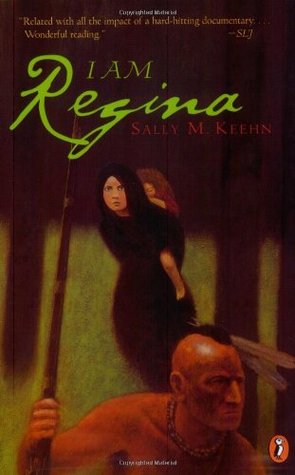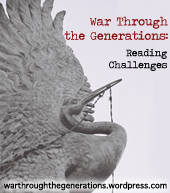 Welcome to the first week of the 2014 War Through the Generations With a Twist Read-a-Long of I Am Regina by Sally M. Keehn for April.
Welcome to the first week of the 2014 War Through the Generations With a Twist Read-a-Long of I Am Regina by Sally M. Keehn for April.
Because this middle-grade novel is so short, we’re only hosting 2 discussions for it.
For this week’s discussion, we’ve read chapters 1-13.
Serena: When we start out in I am Regina, we meet the main character and her family. What role do you think Regina plays in the family structure, and do you think that her role in her own family plays a role in why she is selected by the Indians?
Anna: I’m not sure Regina’s role in her family had anything to do with her being taken. I assumed that had more to do with her being a girl and a child. It seemed as if the other captives that day were either children or women, aside from the one man who spoke the Indian’s language.
As for her role in the family, she is the youngest, and her innocence comes through, especially in her outright fear about the rumors of Indian sightings and her constant need for comforting from her mother. It seems like her bond with her mother will be important throughout the story, and the author does a good job of setting that up from the beginning, even though we only meet her mother for a few pages. The close-knit structure of the family makes it even more heartbreaking when Regina witnesses her father and brother die, knows nothing about the fate of her mother and other brother, and is pulled away from her sister when the Indians part ways and go to their respective villages.
Serena: I agree that I’m not sure her role in the family has anything to do with her capture, but does establish her sort of as the younger child who is just beginning to learn responsibility in her own family unit. It strikes me that they would want to capture those who are young enough to be trained but not too young that they cannot work.
I also noticed that these were German immigrants and that the ship’s name was Patience. I wonder if that is a foreshadowing for Regina. Perhaps she needs patience, and definitely, her faith to cope with what’s on the horizon. It seems like religion is a big part of this novel.
Anna: But they also kept the girl Regina named Sarah, who was so young she had to be carried the whole way to Tiger Claw’s village and doesn’t seem to do any work when she first arrives. Being told from Regina’s point of view, we unfortunately don’t see their reasoning for deciding who to kill and who to capture.
That does seem like a major foreshadowing, and it also gives readers a bigger understanding of the difficult life Regina has lived for someone so young, from the arduous journey on the ship to America to establishing and working the farm to the latest, even harsher, upheaval.
Religion does play a big role in the novel, but I like that it’s not one of those preachy stories. The author does a good job showing how her faith helps her to survive.
Knowing that this book is based on a true story makes it even more moving and sad to me. Do you think the author does a good job balancing the “good vs. evil” aspect of the various sides of the war? As Regina is assimilated into the village, it’s a wake up call to her that there are shades of gray, that both sides have done some really terrible things.
Serena: I do like how the author portrays the religion as her faith that she turns to to keep herself strong. Comparing it to Indian Captive, which I read recently, with a similar story, the religious aspects are more even handed here. I like that.
As for the balance between good and evil, I think that’s done well too. There are good and bad among the tribes and good and bad among the whites. Regina goes from being a naive girl fearing the Indians to realizing that the Indians can be good and caring too. Both this and the Indian Captive are based on true stories, and it seems that this was a regular occurrence during the French and Indian War.
Do you think Sarah’s age made it easier for her to adapt to her new life and name, Quetit, than Regina?
Anna: Yes, I think Sarah’s age made it easier for her, especially if she’s not able to remember her life before. The fact that she didn’t talk until arriving at the village also helped her cope, I’m sure, because she didn’t have the same struggle Regina had in wanting to hold onto the language she has always spoken and needing to communicate in the tribe’s language to get along in her new life and avoid beatings or worse for refusing to embrace her new status as Indian.
I think the author does a great job of showing how Regina struggles with the memories of what happened on the day she was captured and how she struggles to adapt to this new life, where she has to work even harder at every day tasks than she did on the farm. There was even a moment where she felt guilty for dancing. I’m really curious as to what will happen in the second half, because she seems to be settling into her life in the village now, making friends and even softening to Woelfin, and as war comes knocking on her door, I’m sure she will have some very difficult choices ahead of her. How long can she hold onto her memories and her language?
For a middle grade novel, I am very impressed so far.
Serena: I think Regina has gotten stronger as the novel moves forward, thanks to some kind guidance.
While I’m worried about the impending war coming to the village, I’m also concerned about her near Tiger Claw, especially since he’s drunk most of the time and he’s seen her dressed up. That concerns me.
I wonder how much of Woelfin’s bitterness is tied to the death of her husband and the disappointing son, both of which had help from the white man? Also, I wonder if Regina would return to the white man when all is said and done, if she’s given that chance.
Anna: I think any sexual interest Tiger Claw may have in Regina probably would be glossed over, since it is a book for younger readers, but I was thinking the same thing. I think Woelfin has a lot to be bitter about, and I’m curious to see how her relationship with Regina evolves. If Regina has to choose between the tribe and the white men, I think whether or not her mother is still alive will figure heavily into that decision, and hopefully that won’t be an unanswered question for her.
Serena: You’re probably right that they will gloss over the sexual aspect, but he could still try to make her his wife. And I think you’d get the picture about what he’s after, at least older readers would.
Woelfin is an enigma. We know about her past, but we also know about her current life in the village too, and it seems that she has less than others and part of that is related to Tiger Claw. He seems more interested in drinking and war than much else, including caring for his own mother.
I do wonder about Regina’s brother and mother and whether they were captured, killed, or escaped from captors. That will be interesting to find out. I find this middle-grade book to be well done.
Any final thoughts?
Anna: That’s why I’m torn about the first-person viewpoint. I think it’s essential on the one hand to show Regina’s internal struggles and assimilation, but it also prevents us from getting a handle on the other characters.
I can’t wait to read the second half!
April 11, 2014
Categories: French/Indian War . Tags: 2014 War Through the Generations With a Twist, French and Indian War, I Am Regina, read-a-long, Sally M. Keehn . Author: sagustocox . Comments: 5 Comments







